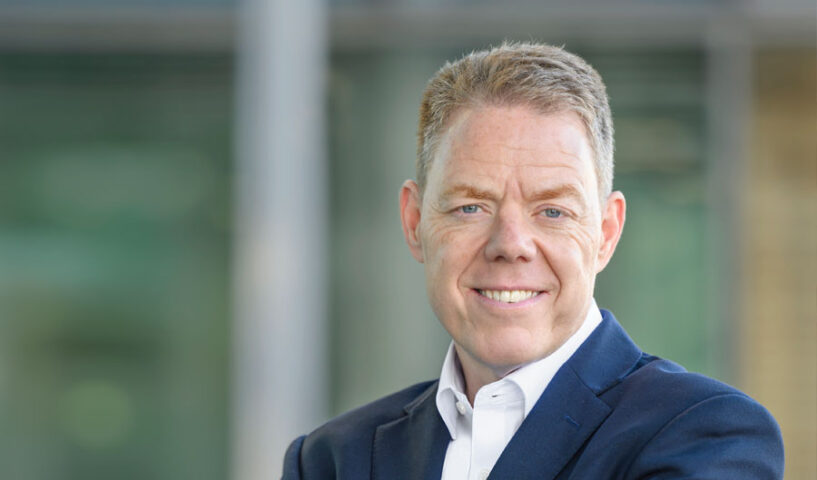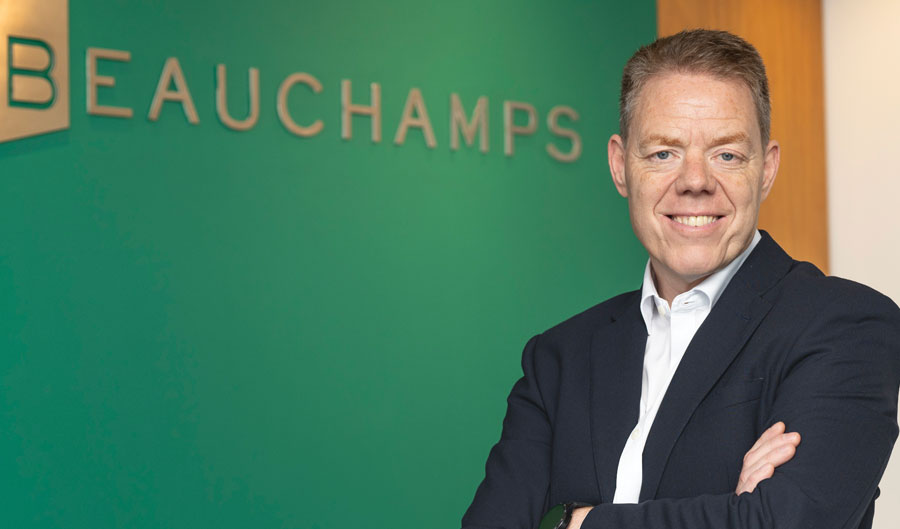
Biomethane: A sustainable industry of scale
4th October 2024
Minister Eamon Ryan TD: A bright and sustainable energy future
7th October 2024Cover: Winds of change

Partner and head of the energy and natural resources group at Beauchamps, Ainsley Heffernan, discusses the significant changes he has observed in the Irish renewable energy sector over the last two decades.
In 2001, Heffernan spearheaded a bold decision by Beauchamps to form Ireland’s first energy law team focused exclusively on renewables. The move represented incredible foresight when one considers the subsequent transformation of Ireland’s energy landscape and the establishment of Ireland’s national climate objectives.
Heffernan is unequivocal that the decision to focus solely on renewables was the correct one, but emphasises that the first few years were challenging.
“In forming the group and focusing solely on renewables, we were an outlier. At that time, the energy sector and energy law was very much focused on conventional plant such as coal, oil, and peat. Renewables were on the fringes,” he says.
Not long after the creation of Beauchamps’ renewable energy group, the Commission for Energy Regulation, in consultation with ESB, imposed a moratorium on new wind farms connecting to the national grid, due to concerns about how wind energy could impact on the security and stability of the power system. “In 2003 and 2004, it was difficult to be speaking at wind energy conferences in places like Hamburg, flying the flag for windfarm development in Ireland, when there was a system-wide ban on new connections. However, we believed in what we were doing and subsequently the moratorium was lifted. The rest, as they say, is history.
“In an environment where we are now seeing many legal practices on the island, and elsewhere, promoting their renewable credentials and, to a degree, downplaying their fossil fuel work, it is good to be able to say that this is not a late conversion for Beauchamps. Rather, it is something we have always done.”
Beauchamps’ team has extensive experience representing developers, funders, and investors in a wide variety of renewable energy projects, with a combined generation capacity of over 2GW to date. Described by Heffernan as a “cradle to grave type” service, Beauchamps provides expert advice through the whole project cycle from feasibility, right through to planning, financing, and ultimately construction of the project.
Alongside the expertise exhibited in its core group, Heffernan outlines that his team is bolstered by Beauchamps’ wider expertise in areas such as construction, project finance, corporate, and property, ensuring that the clients benefit from a broader bandwidth of experience.
On attracting and retaining talent, Heffernan says: “One of the notable advantages of our decision to focus solely on renewables is the positive signal this sends, not only to clients, but to our staff. Law has become a competitive field for talent and there is a notable trend for lawyers seeking to work in areas where they can make a positive social impact. A career in renewable energy law provides the opportunity to work on large and complex projects which make a real contribution to achieving our decarbonisation goals and meeting our climate objectives.”
Transition
Asked to elaborate on the seismic changes within the energy sector since his early days in energy law, Heffernan observes: “In the early part of my career, renewables in Ireland meant onshore wind. The last 10 years has seen a large shift in the diversity of the generation mix.”
Heffernan points to the development and scaling of technologies such as solar PV and offshore wind in Ireland’s energy mix, but simultaneously emphasises the importance of energy storage and demand side management. He also sees significant opportunities in biomethane and green hydrogen as key enablers to decarbonise hard to abate sectors like heat and transport.
Notable trends indicated by Heffernan include the emergence of larger stakeholders on the energy generation side, partly due to market design, and a greater role for the consumer enabled by technology.
Additionally, he points to the increased role of ‘big tech’ players, such as data centres, who not only represent large energy consumption, but are also recognised as key players in the additionality of new wind and solar projects, and who are providing alternative routes to market beyond the Government’s Renewable Electricity Support Scheme (RESS).
“What we have needed to do, as a small island with limited interconnection, but with a very large proportion of renewables on our system, is be a bit more innovative than other countries,” says Heffernan.
Applying this logic to his practice, the Partner explains that he regularly advises junior lawyers that their role is not simply to identify and categorise risk on a particular project, but also to mitigate that risk by proposing practical and commercial solutions. This commercial solutions-focused approach, he believes, sets Beauchamps apart from many of its peers.
2030 targets
Despite significant progress, which has enabled Ireland to dramatically increase the levels of renewables in its energy mix, Heffernan believes Ireland will fall short of its ambitious targets set for 2030.
“Assessing what has happened in recent years, it was estimated that we would have needed approximately 600MW of new onshore wind generation every year to meet our 2030 targets, but actual constructed capacity has been just a fraction of that figure. When it comes to our offshore wind targets, an earlier than expected shift from a developer-led approach to a plan-led approach, and a delay in identifying designated marine areas for offshore renewable development, has sent negative investment signals to the market. The star performer in the last few years has been solar, which has now reached nearly 1.2GW of installed capacity from a standing start.
“From an energy perspective, 2030 is tomorrow and 2050 is next week, so even the slightest delay to the planned increase in generation will have implications on reaching the intended targets.”
Challenges
Aside from grid, the most identifiable challenge to increased renewables in Ireland to date has been a planning system that is not conducive to the scale and pace of project delivery that is needed. A proposed Planning and Development Bill 2023, which is currently making its way through the Houses of the Oireachtas has been a welcome development. However, some criticism has been levelled at whether the almost 800-page piece of legislation will provide adequate clarity in the short-timeframe required.
Regardless, Heffernan does not share the concern voiced by some about the length of the Bill, recognising that consolidation of any legislation is a difficult process, particularly in an area as dynamic as planning law. However, he echoes a common assessment from the renewable energy industry that the Bill represents a “missed opportunity”.
Prior to the Bill’s publication, industry had identified two major requests of the Government’s legislation, namely, mandatory time periods for a rebranded An Bord Pleanála (An Coimisiún Pleanála) to make decisions on appeals and applications, and changes to the judicial review process that would include prescribed timelines and set new criteria for being granted leave to apply.
“The Bill started out with ambitious and laudable goals, and while yet to be finalised, it does appear to have made progress in areas such as mandatory timelines,” he says, adding: “However, my own reading – and having spoken to some of our planning law experts internally – is that the Bill has been watered down through amendments. For example, mandatory timelines have been included, but they are exceptionally generous and do not guarantee default permission once the timeline has been passed.
“I understand that there are limitations on how far we can go with planning reform, especially as we are bound by the Aarhus Convention, but I take the view that extreme challenges require extreme measures.
“We have to start seeing climate change for what it is – an extreme existential threat. Unfortunately, like many democracies, our system tends to deal with challenges in election cycles, an approach that is better suited to dealing with short term problems rather than long-term threats.”
The Beauchamps’ partner asserts that future progress on renewables development does not lie in the publication of the Bill alone and that other levers exist to speed up development.
“Primary legislation can only do so much. The details are always in the secondary legislation, in the regulations, and in ministerial guidelines, which will be of great interest. For example, the Wind Energy Guidelines have existed for a long time and are in need of review. These are positive things that can be done in the near term.
“The other aspect of faster renewable deployment is resourcing within the planning system. It is something the industry has persistently lobbied for, and to be fair to the Government and Minister Eamon Ryan TD, it is something that has been heard. Even the best planning system in the world will not deliver unless it is adequately resourced. The additional resources and powers allocated to An Bord Pleanála are welcome, but there must also be an understanding that that there is a legacy of underinvestment that must be addressed if we are to move beyond running to stand still.
“From an energy perspective, 2030 is tomorrow and 2050 is next week, so even the slightest delay to the planned increase in generation will have implications on reaching the intended targets.
Ainsley Heffernan
“As more offshore applications enter the planning system, we need a lot more resources for the decision-making bodies so that they can make those decisions quickly, and in a manner which sees those decisions stand up when challenged.”
At the same time, Heffernan recognises that the responsibility of reducing the planning bottleneck does not lie with government alone.
“There is an acknowledged responsibility from developers and industry of the need to submit better applications and to properly engage with communities. Not all objections are necessarily spurious. As a society, there needs to be an understanding that this is not a zero-sum game. It does not have to be renewable energy development or the environment; it can be both.”
Asked whether he believes intended changes in planning law have made Ireland a more desirable destination for renewables investment, Heffernan adds: “I do not think the Planning and Development Bill has moved the needle on that massively, but it does factor into combined progress such as grid investment and regular route to market auctions.
“I believe there are still a number of quick wins we can achieve in this regard, such as the regulatory changes promised under the Climate Action Plan for private wires. These are the types of actions that can send the right investment signals, but we are slow to act. A change in policy to allow private wires and private networks was promised as far back as 2019 in the first Climate Action Plan. Yet despite a lengthy public consultation in August 2023, we are still waiting for the new policy to be published by the Department.”
On whether a forthcoming election and potential change of government poses a challenge to renewable energy delivery in Ireland, Heffernan indicates that one of Ireland’s greatest strengths is a broad political consensus on the importance of renewable energy to the economic and societal future of the Island.
Future
In 2024, Beauchamps recruited a senior planning associate and a new partner in construction to bolster the energy and natural resources group, signalling its intended growth pathway in coming years. Heffernan reiterates his belief that Beauchamps’ long standing reputation in the renewable energy sector places it high in an increasingly competitive legal market.
Acknowledging entrance into the market of larger legal firms from other jurisdictions, such as the UK, many of whom hope to replicate their international work in Ireland, Heffernan believes that local expertise and experience will continue to be invaluable.
“Ireland’s regulatory, property and planning systems are quite different from those in the UK and continental Europe. The ability to navigate those systems effectively, for the benefit of our clients, is a critical skill which we have built up over multiple decades. We have a track record of delivery that we are very proud of.”
On future ambitions, Heffernan says that he aims to ensure that Beauchamps remains the law firm of choice for those involved in Irish renewable energy. Elaborating further, he says: “At Beauchamps we have taken the strategic decision to not try and be all things to all people, but instead develop specialist knowledge, expertise, and experience in core areas.
“Renewable energy is one of those areas. Our reputation is excellent given that we have operated in the sector for so long and successfully acted for a lot of major stakeholders. Now I want to consolidate that to ensure that we are the first choice legal firm for anyone seeking to develop, finance or acquire a renewable energy project in Ireland.
“To do so, we are scaling our business in areas like planning and environmental law, construction law and regulatory law to ensure that we can fully service our clients and support them in every aspect of their project development.
“At the same time, we have been – and aim to continue to be – a trusted adviser to government and the public sector. Ultimately, we are all trying to achieve the same goal, to decarbonise our economy and reach our climate change targets.”


